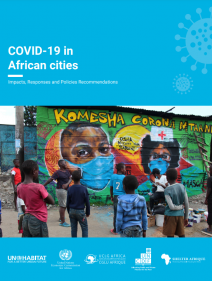COVID-19, a global pandemic declared by the World Health Organization (WHO), is crippling the global economy and upending people’s lives thereby threatening sustainable development across all its dimensions. Africa is also facing the dire consequences of the crisis, necessitating timely response, recovery and rebuilding policies and strategies. Globally, urban areas are the epicenters of the epidemic accounting for the vast majority of the confirmed COVID-19 cases. This report looks at the impacts, responses and policy pathways related to COVID-19 in the context of cities in Africa. Africa is currently experiencing the most rapid urban growth in the world. The urban population increased more than 10 times in six decades, from 53 million to 588 million during the period from 1960 to 2020. 1 African cities are epidemiological foci of for COVID-19 like other urban areas globally. However, the quality and nature of Africa’s urbanization exacerbates transmission rates of infectious diseases like COVID-19 and makes containment and response measures considerably more difficult.
Share this:
Impacts, Responses and Policies
Release Date:
15 June, 2020
© United Nations Economic Commission for Africa

